SWEDISH SOUTH ASIAN STUDIES NETWORK
Programme in Medicine/Global Health,
The Sahlgrenska Academy at the University of Gothenburg
Postal address: Sahlgrenska akademin vid Göteborgs
universitet, Box 400, SE-405 30 Göteborg, Sweden
Visiting address: Medicinaregatan 3
Web page: http://www.sahlgrenska.gu.se/english
Contact persons: Rune Andersson, Professor in Global Health, Institute of Biomedicine, phone: +46 (0)31 3424923
Gunilla Krantz, Professor, Dept. of Community Medicine and Public Health, phone: +46 (0)31 786 6861
Alexandra Krettek, Associate Professor, Dept. of Internal Medicine, Institute of Medicine,
phone: +46 (0)31 693966
Karin Dejke, International Coordinator (Programme in Medicine, Masters level),
International Desk, phone: +46 (0)31 786 30 81
– Collaboration programme with India
– Collaboration programme with Nepal
– Collaboration programmes with Pakistan and Sri Lanka
The Sahlgrenska Academy
 The Sahlgrenska Academy is the largest faculty at the University of Gothenburg. It is an international faculty. In many fields, research at the Academy is among the highest ranking internationally for example in pharmacology, obesity, children’s health, odontology and cardiovascular disease.
The Sahlgrenska Academy is the largest faculty at the University of Gothenburg. It is an international faculty. In many fields, research at the Academy is among the highest ranking internationally for example in pharmacology, obesity, children’s health, odontology and cardiovascular disease.
The strategic work for internationalisation at the faculty is headed by the internationalisation committee. Each institute and programme has one teacher/coordinator in charge of the internationalisation process. The aim is to create numerous international possibilities for international development for students, teachers and researchers at the Academy.
Health Sciences consist of medical, odontological and pharmaceutical science, as well as health care and public health, but the whole of this area is greater than the sum of its parts. Not only are the individual disciplines of interest, but also the opportunity to develop a new science characterized by depth and interdisciplinary synergy, which is unique to the Sahlgrenska Academy.
The Sahlgrenska Academy in brief (in 2011):
First and second cycle students: 4000
Third cycle students: 1000
Employees; 1500
Researchers/lecturers: 850
Full Professors: 234
Turnover in SEK million: 1775
The Sahlgrenska Academy is the faculty of health sciences at the University of Gothenburg. Education and research are conducted within the fields of pharmacy, medicine, odontology and health care sciences.
About 4000 undergraduate students and 1000 postgraduate students are enrolled at the Sahlgrenska Academy. Of the 1500 employees, 850 are researchers and/or lecturers.
The Sahlgrenska Academy offers education at first, second and third cycle.
The Sahlgrenska Academy at the University of Gothenburg has a unique breadth in health sciences, consisting of six institutes within medicine, odontology and health care sciences. The fact that these departments are in one and the same academy/faculty enables effective co-operation between different fields.
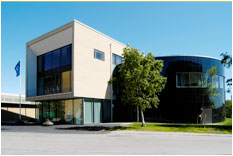 Institutes at the Sahlgrenska Academy
Institutes at the Sahlgrenska Academy
Institute of Biomedicine
website: www.biomedicine.gu.seInstitute of Clinical Sciences
website: www.clinsci.gu.seInstitute of Health and Care Sciences
website: www.caresci.gu.se
Institute of Medicine
website: www.medicine.gu.se
Institute of Neuroscience and Physiology
website: www.neurophys.gu.se
Institute of Odontology
website: www.odontology.gu.se
Research at the Sahlgrenska Academy is among the highest ranking internationally especially in fields such as pharmacology, specialist dental care, obesity, paediatrics and cardiovascular disorders. The researchers at the Academy work closely with the Sahlgrenska University Hospital.
The Sahlgrenska Academy covers an impressive range of research; basic studies of the structure of molecular structure and cellular functions, experimental studies of the principles of disease, public health sciences and epidemiology.
Programme in Medicine (Läkarprogrammet)
330 ECTS credits – taught in Swedish
This programme prepares the students to work as physicians and in medical research. In order to become a registered physician in Sweden, it is necessary to complete 18 months of general work experience after your Medical Degree as a junior physician in medicine, surgery, primary health care, and psychiatry. An examination covering the entire period of work experience must be passed before the student becomes a registered physician. A work permit is necessary for the period of work experience.
Special requirements: upper secondary studies in Mathematics, Physics, Chemistry, Biology.
Degree: Degree of Master of Science in Medicine
After graduation follows periods of practical experience/internship of at least 18 months in order to become a registered physician. After having successfully completed the programme, the physician obtains his/her licence to practise (full registration), which is granted by the National Board of Health and Welfare.
Admission every term (twice a year).
Degree Project, Masters thesis, Programme in Medicine
During the 10th semester the students undertake an individual scientific work, a master´s thesis (30 ECTS credits).
The main profile for this term is Global Health.
The Degree project is included in the University Medical Degree (MD).
The course gives the student experiences of science and research. The main purpose of the course is that the student should acquire an increased knowledge and an enhanced understanding of a medicinal area of special interest for the student ,and get training in how to critically examine, integrate, and present complex medical and scientific information orally and in writing. The Degree Project, which is the core of the course, can be an experimental, epidemiological/global health or clinical project or an analytical systematic review of the literature.
The Degree Project can take place at Gothenburg University or another institution of higher education with similar status in Sweden or abroad. The course contains three different features; en introductory part on research and scientific methods, the planning, launch and implementation of a scientific project and, finally, both an oral and written
thesis/examination. The subject for the Degree Project, and how it shall be performed, is decided in consultation between the student ant the tutor. A written agreement and a project plan are established. Learning is supported in individual tutorials and in group sessions throughout the course. The thesis is presented at a seminar with experts within the area of thesis. The student also provides an individual written project thesis.
This thesis is then scrutinized and approved by an appointed examiner.
Collaboration in India
Sahlgrenska Academy offers field studies at advanced level for students at the Programme in Medicine. Collaboration agreements exist with the folllowing institutions in India:
Vellore Christian Medical College
– Studies on antibiotic resistance
Union Biblical Seminary, Pune
Attitudes, teaching, coping and knowledge on HIV among Christians, Muslims, Hindus and Buddhists
Kannur Medical College, Kerala
Studies on Parkinson´s disease or peripheral neuropathy
Regional Medical Research Centre (ICMR), Port Blair, Andaman and Nicobar Islands
Field studies on leptospirosis, HIV awareness and gastrointestinal infections.
Plans to send students in November 2011 to study dengue fever and chikungunya feverS: t Lukes Medical Society in Nannaj (outside Solapur in Maharashtra)
Study on HIV awareness and risk behavior
Aurad (outside Gullbarga in Karnataka)
Study on HIV awareness and risk behavior
AIDS HealthCare Foundation and Lott Carey Baptist Mission Charitable Trust, New Delhi
Study of patients on HIV treatment
 In November 2010, University of Gothenburg launched a new project entited Go:India. Sahlgrenska Academy, through its Programme in Medicini/Global Health, is very much involved here.
In November 2010, University of Gothenburg launched a new project entited Go:India. Sahlgrenska Academy, through its Programme in Medicini/Global Health, is very much involved here.
It is one of a number of new international projects at University of Gothenburg. They are part of a long-term ambition to create a profile such as ‘The Global University’ at University of Gothenburg (GU). This notion is based on the university’s action plan for internationalisation 2008-2012. This plan focuses on the development of exchange, at all levels, with universities in other countries where special attention should also be given to developing a long-term and sustainable strategic collaboration with partners in for example South Asia. The cooperation efforts should be clearly linked to values of international solidarity and global responsibility, and must be of a different character than traditional student mobility. More information on The Global University.
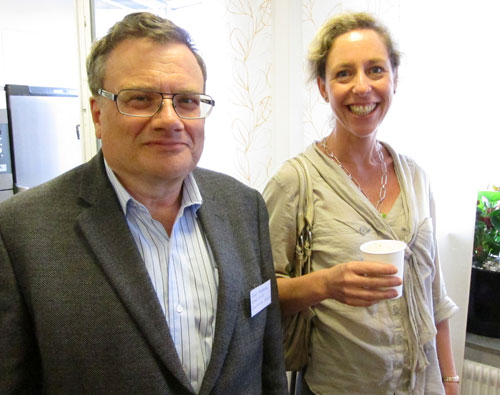 |
| Rune Andersson and Karin Dejke at the Go:India kick-off conference in Gothenburg. |
Go:India will be a three year project (2011 – 2013), intended to build a platform for co-operation within the areas of research, teaching and education between its Swedish partners, also involving researchers at the Faculty of Fine, Applied and Performing Arts (School of Photography, and the School of Design and Crafts); Faculty of Arts (Dept. of Literature, History of Ideas, and Religion); and the Faculty of Social Sciences (Dept. of Social Work), and their collaboration partner institutions in India.
These are Banaras Hindu University (BHU) in Varanasi; Sarai/Centre for the Study of Developing Societies (CSDS) in Delhi; Gandhian Institute of Studies in Varanasi; Jadavpur University in Kolkata; Punjabi University in Patiala; Visva-Bharati University in Shantiniketan; Tata Institute of Social Sciences (TISS) in Mumbai; Srishti School of Art, Design and Technology in Bangalore; and Union Biblical Seminary in Pune.
More information on the Go:India project web site. ![]()
On 7–9 June 2011 the Go:India project arranged its first joint
event in Gothenburg, a Kick-off conference where representatives from all the partner institutions met to discuss and plan the details of the planned activities for the coming three years, including, among other things, joint conferences, writing of joint research projects, teacher and student exchange. Lars Eklund, Anna Lindberg and Julia Velkova represented SASNET at the three-day meeting.
See the programme for the meeting. ![]()
See Lars Eklund’s photos from the first day. ![]()
Collaboration with Nepal
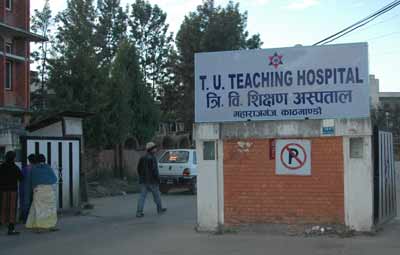 Since several years the Faculty of Medicine at Gothenburg
University has
been involved in a Linnaeus-Palme
International Exchange Programme with the Tribhuvan University in
Nepal, for students at the Medical
doctors training programme. More information
about the Linnaeus Palme programme, administered by the International Programme Office
for Education and Training but financed by Sida.
Since several years the Faculty of Medicine at Gothenburg
University has
been involved in a Linnaeus-Palme
International Exchange Programme with the Tribhuvan University in
Nepal, for students at the Medical
doctors training programme. More information
about the Linnaeus Palme programme, administered by the International Programme Office
for Education and Training but financed by Sida.
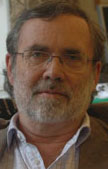 The collaboration project with Nepal was initiated by Professor Göran
Bondjers (photo to the left),
former Dean of the Faculty of Medicine. During the period 2006 – 2010, he was Vice Chancellor for the Nordic
School of Public Health (NHV), also in Gothenburg, but he is now back at Sahlgrenska Academy. He is also senior scientific advisor at Global Health Europe, a not for profit group established to provide a platform for discussion of global health issues, based in Geneva, Switzerland. Since 2010, he also has an honorary professorship at Hanoi Medical University
in Vietnam.
The collaboration project with Nepal was initiated by Professor Göran
Bondjers (photo to the left),
former Dean of the Faculty of Medicine. During the period 2006 – 2010, he was Vice Chancellor for the Nordic
School of Public Health (NHV), also in Gothenburg, but he is now back at Sahlgrenska Academy. He is also senior scientific advisor at Global Health Europe, a not for profit group established to provide a platform for discussion of global health issues, based in Geneva, Switzerland. Since 2010, he also has an honorary professorship at Hanoi Medical University
in Vietnam.
![]()
(In December 2005, Staffan Lindberg and Lars Eklund, SASNET’s director and deputy director, visited Tribhuvan University Teaching Hospital in Kathmandu, and met with some of the key persons involved in the Linnaeus Palme exchange programme with Gothenburg University. Read their report from the meeting.)
Since 2008 the Linnaeus Palme exchange programme between Sahlgrenska Academy and Tribhuvan University is coordinated by Associate Professor Göran Kurlberg at the Department of Surgery, Institute of Clinical Sciences, Sahlgrenska Academy. Dr. Kurlberg is assistant supervisor for PhD students and is working as a colorectal surgeon. He has previously conducted research work in the field of experimental small testine transplantation.
He has a strong connection to Nepal, since he worked in the country during long periods in the 1980s and also later. Recently, in early 2008, he spent two months doing voluntary work for Skandinaviska Läkarbanken (funded by the Swedish NGO Erikshjälpen) at Tansen Mission Hospital in the mountains near Bhairawa. Read a report from his work in Nepal.
The Department of Surgery received grants from the Linnaeus palme Exchange Programme for the Tribhuvan University collaboration for the period 2008-09 (more information), and again for the period 2009-10 (more information).
In late March 2009, Dr. Kurlberg went to Nepal for a three-week stay along with Dr. Leif Dotevall, Department of Infection, Sahlgrenska Academy. The two spent the time teaching Nepalese students and discussing the programme activities with their Nepalese counterparts.
Prof. Jörgen Engel, Dept. of Pharmacology, Institute of Neuroscience and Physiology at the Sahlgrenska Academy at Göteborg University, has also been engaged in the programme on the Swedish side.
Collaboration project with Nepal part of Gothenburg’s Global University programme 
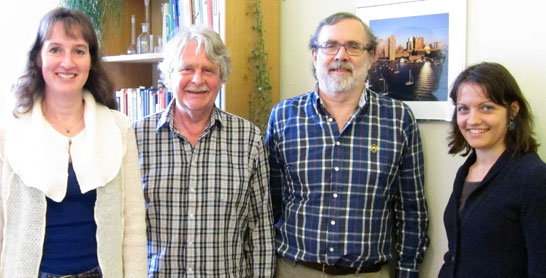 |
| Alexandra Krettek, first to the left, and Göran Bondjers, second from right, with Lars Eklund and Julia Velkova from SASNET, during a May 2011 meeting. |
Göran Bondjers and Göran Kurlberg are both members of a Nepal related international project initiated by University of Gothenburg in November 2010, as part of a long-term ambition to create a profile as ‘The Global University’, based on the university’s action plan for internationalisation 2008-2012. More information on The Global University.
It is a collaboration project with three partner universities in Nepal – Kathmandu University, Tribhuvan University, and Patan Academy of Health Sciences. The project is entitled ”Collaboration between GU and Nepali Institutions: Strengthening Health Education, Supporting Research, Monitoring Health”. It extends the previous Linnaeus Palme exchange programme experiences with Tribhuvan University mentioned above, including additional Nepali institutions and programmes for both education and research. The research part is new. The exchange programme has also been extended to include administrative staff and PhD candidates.
The project is headed by Associate Professor Alexandra Krettek, researcher at Sahlgrenska Academy and the Nordic School of Public Health (NHV) in Gothenburg.
Other project members are Associate Professor Ulla-Britt Engelbrektsson and PhD candidate Susanne Åsman, Social Anthropology, School of Global Studies; Professor Emeritus Jan Bärmark, Dept. of Philosophy, Linguistics and Theory of Science; and Lecturer Jonas Öberg, Dept. of Applied IT.
More information about the Nepal collaboration project. ![]()
In May 2011, SASNET’s Lars Eklund and Julia Velkova visited NHV, and met with Alexandra Krettek and Göran Bondjers
to discuss the Nepal project. Read a report from the meeting.
Collaboration with Pakistan and Sri Lanka
The Department of Public Health and Community Medicine at the Institute of Medicine is involved in collaboration programmes with researchers and universities in Pakistan (Aga Khan University) and Sri Lanka. Professor Gunilla Krantz is responsible for these efforts. Read more on the separate page for her department.
SASNET - Swedish South Asian Studies
Network/Lund University
Address: Scheelevägen 15 D, SE-223 70 Lund, Sweden
Phone: +46 46 222 73 40
Webmaster: Lars Eklund
Last updated
2011-08-23
